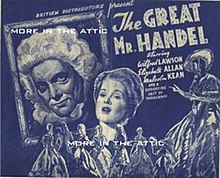The Great Mr. Handel is a 1942 British Technicolor historical film directed by Norman Walker and starring Wilfrid Lawson, Elizabeth Allan and Malcolm Keen.[1] The film is a biopic of the 18th-century German-British composer Georg Friedrich Händel, focusing in particular on the years leading up to his 1741 oratorio Messiah.[2]
| The Great Mr. Handel | |
|---|---|
 | |
| Directed by | Norman Walker |
| Written by |
|
| Produced by | James B. Sloan |
| Starring | |
| Cinematography | |
| Edited by | Sam Simmonds |
| Music by | |
Production company | G.H.W. Productions |
| Distributed by | General Film Distributors |
Release date |
|
Running time | 98 minutes |
| Country | United Kingdom |
| Language | English |
Plot
editThis article needs a plot summary. (December 2023) |
Cast
edit- Wilfrid Lawson as George Frideric Handel
- Elizabeth Allan as Mrs. Cibber
- Malcolm Keen as Lord Chesterfield
- Michael Shepley as Sir Charles Marsham
- Max Kirby as Frederick, Prince of Wales
- Hay Petrie as Phineas
- Morris Harvey as John Heidegger
- A. E. Matthews as Charles Jennens
- Frederick Cooper as Pooley
- Andrew Leigh as Captain Coram
Production and release
editThe film was made by the Rank Organisation at Denham Studios, using Technicolor. After a private screening, the company head J. Arthur Rank criticised its lack of glamorous appeal. The film was not a box office success on its release.[3]
References
edit- ^ "The Great Mr. Handel (1942)". Archived from the original on 4 November 2016.
- ^ "The Great Mr. Handel (1942) - Norman Walker | Synopsis, Characteristics, Moods, Themes and Related | AllMovie".
- ^ Macnab p.52
Bibliography
edit- Harper, Sue. Picturing the Past: The Rise and Fall of the British Costume Film. British Film Institute, 1994.
- Macnab, Geoffrey. J. Arthur Rank and the British Film Industry. Routledge, 1994.
- Murphy, Robert. Realism and Tinsel: Cinema and Society in Britain, 1939-1949. Routledge, 1989.
External links
edit